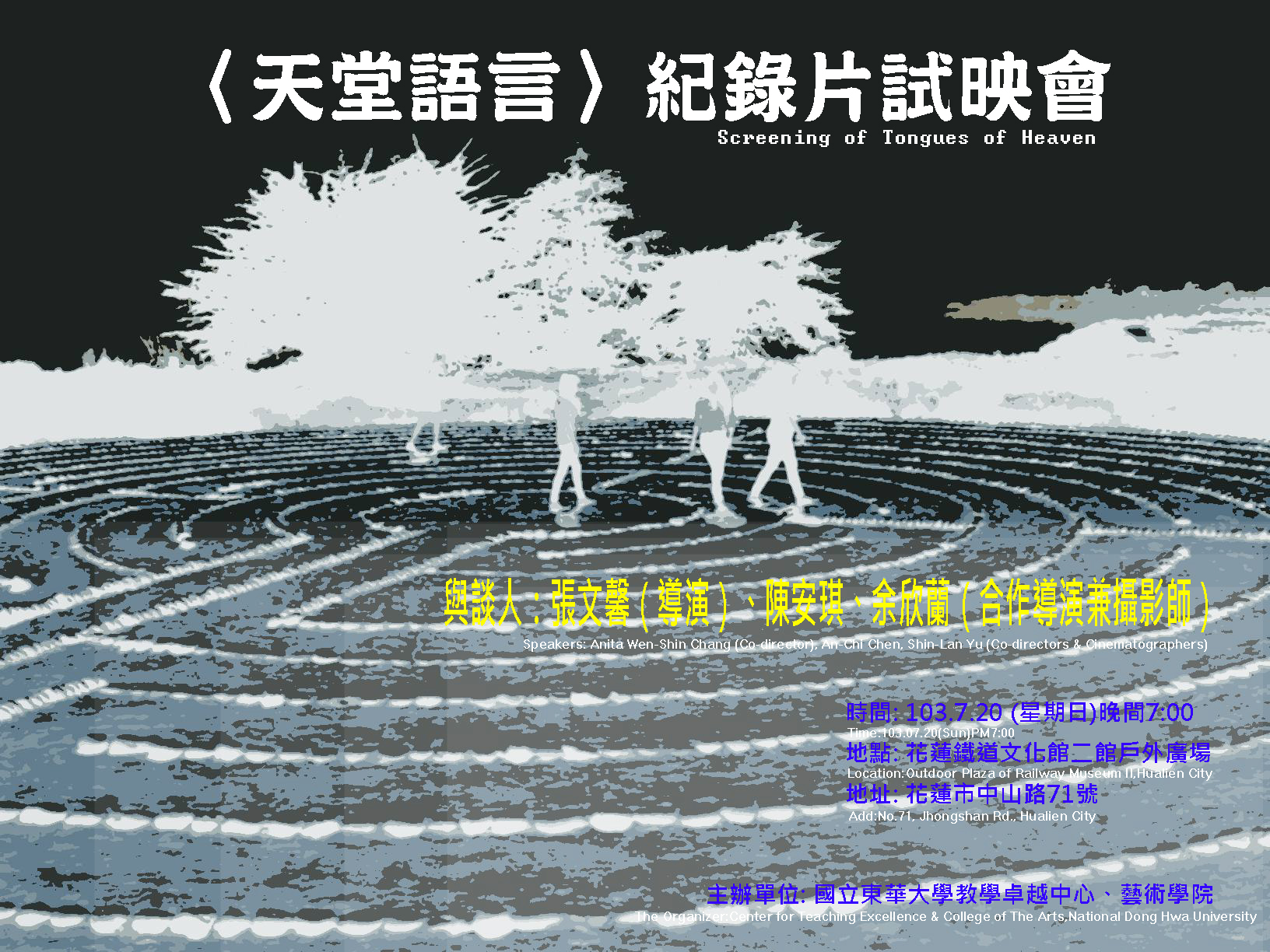

|
|
〈天堂語言〉紀錄片試映會
Screening of Tongues of Heaven
與談人:張文馨(導演)、陳安琪、余欣蘭(合作導演兼攝影師)
Speakers: Anita Wen-Shin Chang (Co-director), An-Chi Chen, Shin-Lan Yu (Co-directors & Cinematographers)
時間: 7/20 (星期日)晚間7:00
〈天堂語言〉(60分鐘,台/美,2013)
場景設定在台灣和夏威夷,
這部實驗性紀錄片關注的重點在於年輕一代的原住民,
以及他們在學習祖先所流傳下來、卻即將失傳的族語所面臨的疑問、
四 個擁有不同背景的年輕原住民女性利用數位影像作為拍攝的主要媒介
她們一同合作並互相交流,討論語言在身分認同及文化上的影響。
在 這個語言近趨同化的時代,以你的母語與他人進行溝通意謂著什麼呢
〈天堂語言〉中有一片段呈現新銳製片陳安琪、
Leivally
余欣蘭參與了獨立製片者張文馨主持的製片工作坊。
也訪問她們的家人及朋友,
你將會同時失去什麼?
影片參與者在夏威夷 的工作坊裡見面了,
她們分享了自己所拍攝的鏡頭、
對於語言復興和最終目標—強化自身與族語的連結的見解。
Tongues of Heaven (60 mins., Taiwan/US, 2013) is the latest film by Anita Wen-Shin Chang.
Set in Taiwan and Hawai'i, territories where languages of the Austronesian family are spoken,
this experimental documentary focuses on the questions, desires and challenges of
young indigenous peoples to learn the languages of their forebears—
languages that are endangered or facing extinction.
Using digital video as the primary medium of expression,
four young indigenous women from divergent backgrounds together collaborate and
exchange ideas to consider the impact of language on identity and culture.
With 96% of the world’s population speaking only 4% of the world’s languages,
what does it mean to speak your mother tongue in this age of language homogenization?
As part of the production process, emerging filmmakers An-Chi Chen,
Leivallyn Kainoa Kaupu, Monica Hau'oli Waiau and Shin-Lan Yu participated in intensive videomaking workshops
with independent filmmaker Anita Chang. After the workshop exercises, the women,
with camera in hand, ask themselves, their families and peers questions—one of which is,
“What do you lose when you lose your native language?” During a culminating workshop,
collaborators met in Hawai'i to share their footage, insights, and concerns regarding the challenges
of revitalizing their languages and ultimately their own relationship to their heritage languages. A
張文馨/合作導演,攝影師, 製片人, 剪接師
獨立電影製片家,教育者和作家。
張文馨的作品在國際放映,並展出
芳草地藝術中心、沃克藝術中心、
國際女性藝術博物館。作品領域包括後殖民主義、
62 Years and 6500 Miles Between (2005)、She Wants to Talk to You (2002)、
Imagining Place (1999)、Mommy、 What’s Wrong? (1997)、
Video Letter to the President (1996) 、 One Hundred Eggs a Minute (1996)。
台灣國立台灣藝術大學電影學系、
其研究出現在各期刊,
和〈同心圓:
舊金山藝術委員會獎助金、國家地理All Roads計劃獎助金、KQED彼得.
歐文 斯製片獎。張文馨近期更在其最新三部作品(包含〈天堂語言〉)
陳安琪 Thalaelethe Titibu/合作導演、攝影師
屏東新好茶部落第三代魯凱族人。
畢業於國立東華 大學民族語言與傳播學系。
2007年 學生時期探討自身認同、
族群認同因而拍攝第一部短片「認同感」
「看見原世界」影像學生組佳作獎。2009年 因八八風災重創屏東縣霧臺鄉,
其作品大多記錄以女性為主,
余欣蘭 Rngrang Hungul/合作導演、攝影師
太魯閣族。畢業於國立東華大學民族語言與傳播學系。
2007年學
族群認同與陳安琪共同拍攝第一部短片「
「看見原世界」影像學生組佳作獎。
2010至2013年與陳安琪
2010年成立原色
以紀錄片來呈現邊緣族群面臨的土地與環境壓迫。
Anita Wen-Shin Chang/ Co-director, Producer, Editor
Anita Wen-Shin Chang is an independent filmmaker, educator and writer. Her works have screened and broadcast internationally, and been presented at the Whitney Museum of American Art, Yerba Buena Center for the Arts, Walker Arts Center, Museum of Fine Arts Houston, and National Museum of Women. Her films and videos are primarily engaged in discourses on postcolonialism, ethnography, diaspora and cross-cultural representation, and include Joyful Life (2007), 62 Years and 6500 Miles Between (2005), She Wants to Talk to You (2002), Imagining Place (1999), Mommy, What’s Wrong? (1997), Video Letter to the President (1996) and One Hundred Eggs a Minute (1996). Chang has taught film and media studies in numerous community and academic settings in the San Francisco Bay Area, and abroad at AAVAS in Kathmandu Nepal, the renowned Motion Picture Department at National Taiwan University of Arts, and the Department of Indigenous Languages and Communication at National Dong Hwa University in Taiwan. Her essays have appeared in journals such as positions: asia critique, Concentric: Literary and Cultural Studies and Taiwan Journal of Indigenous Studies. Honors include the Fulbright Teaching Award, San Francisco Arts Commission grant, National Geographic All Roads grant and KQED Peter J. Owens Filmmaker Award. With her last three films, which include Tongues of Heaven, she has developed a method of collaborative praxis in her filmmaking.
An-Chi Chen (Thalaelethe Titibu)/ Co-director, Cinematographer
A third generation Rukai, An-Chi Chen is from the “XinHaoCha” tribe in Pingdong. She graduated from the National Dong Hwa University with a major in Indigenous Language and Communication. As a student in 2007, she explored her personal and indigenous identities filming her first short film “Sense of Identity,” which was awarded Student Honorable Mention from the Taiwan Indigenous TV Channel. In 2009, as a consequence of the horrific impact of typhoon morakot on Pingdong, she decided to film a documentary of the loss from the typhoon. It took her three years to complete the two films “Wild Lilies Don’t Wither” and “On the Way”. Her other works are mainly focused on women. She has also been interested in indigenous issues and the importance of land towards certain indigenous tribes. She hopes that more people can care and show concern for indigenous problems. Currently, she works as a freelancer.
Shin-Lan Yu (Rngrang Hungul)/ Co-director, Cinematographer
A member of the Truku tribe, Shin-Lan Yu graduated from the National Dong Hwa University with a major in Indigenous Language and Communication. As a student in 2007, she explored her personal and indigenous identities with Thalaelethe Titibu creating their first film “ Sense of Identity,” which was awarded Student Honorable Mention from the Taiwan Indigenous TV Channel. From 2010 to 2013 she filmed “Wild Lilies don’t wither” and “On my way” with Thalaelethe Titibu, in 2010 she created Primary Colors Video Studio. Her other works mainly focus on women. She has also been interested in indigenous and gender issues. This year, 2014, she finished a new work ”People(wolf) has come,” a documentary presenting marginalized groups that face environmental and social oppression. She is currently a freelancer.


